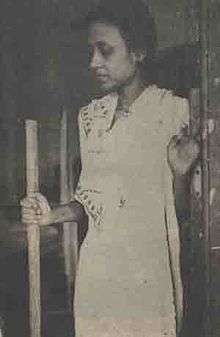Ila Mitra
| Ila Mitra | |
|---|---|
.jpg) Ila Mitra | |
| Native name | ইলা মিত্র |
| Born |
Ila Sen 18 October 1925 Kolkata, British India |
| Died |
13 October 2002 (aged 76) Kolkata, India |
| Spouse(s) | Ramendra Mitra |
Ila Mitra (18 October 1925 – 13 October 2002) was a peasants movement organizer of the Indian subcontinent, especially in East Bengal (now Bangladesh). She was born to an upper middleclass family who had come from Jhenaidah District, in Kolkata on 18 October 1925.[1] She became a communist during her youth. In 1945, she married Ramendra Mitra, who was an active member of the Communist Party despite his lineage from a zamindar (landowner) family of Chapai Nawabganj.
Leading role in peasant uprising
Mitra was the leader of peasants and indigenous Santhals in greater Rajshahi region, currently in the district of Chapai Nawabganj, and was often referred to by them as RaniMa (Queen mother). She organized a peasant-santhal uprising in Nachole Upazila, Chapai Nawabganj on 5 January 1950, but the uprising was thwarted by the police. Mitra was arrested by the police while trying to escape. She was detained at the Nachole police station for four days, and during the detention, she was repeatedly gang-raped and tortured by the policemen.[2] Then she was sent to the Rajshahi Central jail on 21 January 1950, where she was reportedly tortured for not accepting her involvement in the rebellion. After a trial for treason, Mitra was sentenced to life imprisonment.
Later life

Partly due to the torture, Mitra fell very sick in jail. In 1954, the United Front government of Pakistan paroled her and sent her to Kolkata for treatment. To avoid persecution, she did not return to Pakistan and stayed the rest of her life in India. She continued to participate in political activities in Kolkata under the banner of the Communist Party of India and was elected member of Bidhan Shabha (Provincial Assembly) four times between 1962 and 1978. She also participated in mobilizing public opinion and support during the Bangladesh Liberation War of 1971.
Mitra died in Kolkata on 13 October 2002.
Awards
- Soviet Land Neheru for literary translation work
- Tamra Patra from the government of India in recognition of her activities as a leader in the struggle against British Raj.
References
- ↑ Mesba Kamal (2012). "Mitra, Ila". In Sirajul Islam and Ahmed A. Jamal. Banglapedia: National Encyclopedia of Bangladesh (Second ed.). Asiatic Society of Bangladesh.
- ↑ Panjabi, Kavita (14 August 2010). "Otiter Jed or Times of Revolution: Ila Mitra, the Santals and Tebhaga Movement". Economic & Political Weekly. Mumbai: Sameeksha Trust. XLV (33). ISSN 2349-8846. Retrieved 15 May 2016.
Further reading
- Ajoy Roy (18 October 2002), "Comrade Ila Mitra: A tribute [Part I]", Mukto-Mona, retrieved 12 April 2015
- Ajoy Roy (18 October 2002), "Comrade Ila Mitra: A tribute [Part II]", Mukto-Mona, retrieved 12 April 2015
